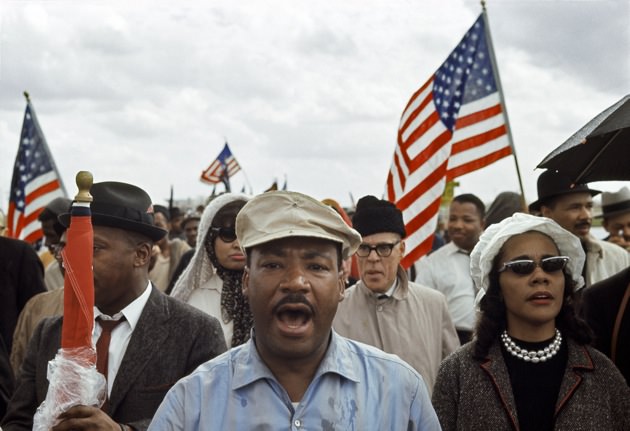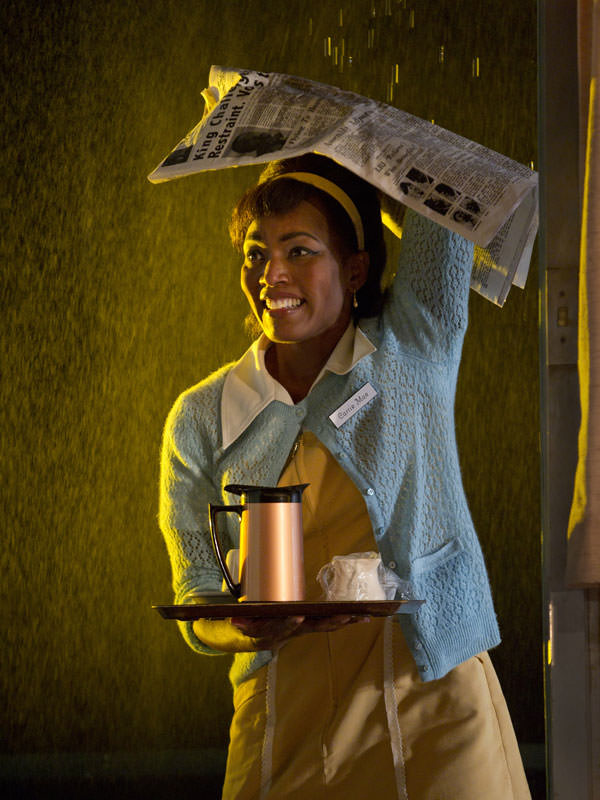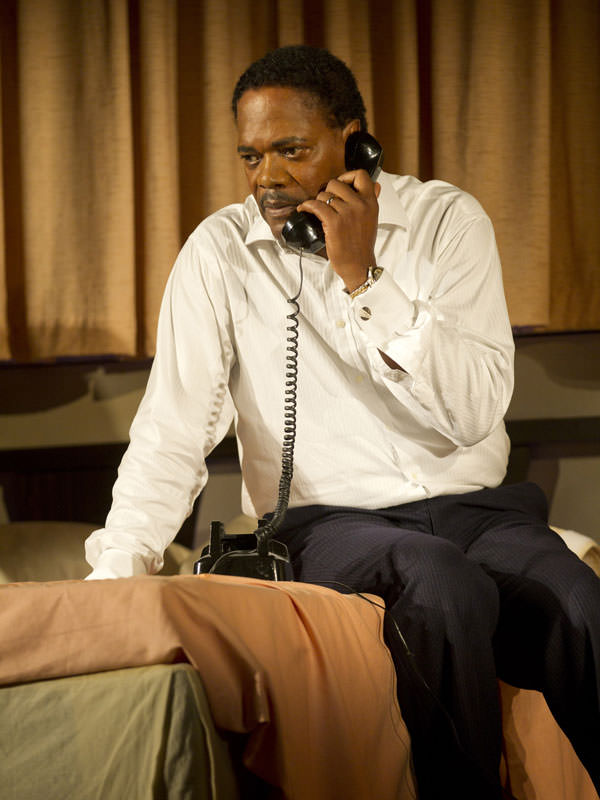The Martin Luther King, Jr. memorial in Washington, DC looks like heroic sculpture from the China of Chairman Mao. In The Mountaintop, a play by Katori Hall now on Broadway, Dr. King is offered yet another tribute his memory could maybe have done without. In Hall’s well-meaning, but naive play about an imagined conversation between King and a maid at the motel where he stayed on the night before he was killed, King’s last hours on earth become an occasion for tribal laughter and warm black feelings. The Mountaintop is so focused on reconciling us—and him—to his death, that Hall seems uninterested in how she might be exploiting King’s legacy.
The sign in the darkness says, “Loraine Motel,” and the lights come up on a worn-looking room of two double beds. Enter from the rain Martin Luther King, Jr. (Samuel L. Jackson), with a hacking cough, calling to Ralph Abernathy to bring him a pack of Pall Malls. He reads aloud from a speech he’s working on; he notes that “Corrie” forgot to pack his toothbrush again. “Shit.” Camae (Angela Bassett), the new maid, arrives almost immediately with his coffee, a newspaper protecting her hair from the rain. She tells him that she’s seen him “on the TV down at the Woolworth’s” and that he’s famous, “like the Beatles.” Their idiom—“Negro talk strike faster than lightnin”—is supposed to be down-home Southern, King off-duty with one of his flock. “I heard you carried on a storm up at Mason Temple….cuttin’ up in the pulpit.” But Katori Hall isn’t drawing on the oral tradition that was also important to the civil rights movement. Ralph Abernathy was said to have been a consummate story teller. But this isn’t even the vernacular of Ossie Davis’s 1963 hit play about a black preacher, Purlie Victorious.
Yet the audience chuckles knowingly as King appreciates Camae’s butt when she’s not looking. Hall’s play glides along on the waters of what we know already about King’s offstage life. She doesn’t have to convince us of anything. Even people who have not read a biography of King or a history of the FBI know that he had affairs and that J. Edgar Hoover had King’s hotel rooms tapped. Agents made Coretta Scott King listen to recordings of her husband having sex with other women. It was not known at the time that King caroused—Lyndon Johnson felt betrayed by King’s opposition to the Vietnam War, yet he refused to use Hoover’s dossier against King, according to Taylor Branch, one of King’s most distinguished biographers. Major news outlets also declined the sex scandals about King that Hoover tried to pass on to them. But for Hall to dwell on his licentiousness is part of what she has described as her project to “humanize” the Nobel laureate.
The comedy in Hall’s play stems from Camae’s recognizing King as a fellow sinner. She teases him that cigarettes and coffee are not a diet befitting a preacher. She reproaches herself for “cussin’” in front of “Dr. Kang. I cuss worse than a sailor with the clap. Ooo, God gone get me!” She is the voice of the people, humorous, reasonable, moral. She doesn’t mind his flirtatiousness. To have been wild, to have had a past, she tells him, is part of his job requirement as a preacher. “Folk won’t listen to you otherwise.” His sexual opportunism is normal, typical of men, Hall seems to be saying, and Camae is there to forgive what is most human in King.
In their instant rapport, they soon have an exchange in which Camae expresses a sort of common-sense skepticism about nonviolence while King defends his philosophy. She tells him that it wasn’t bad weather that kept more people from coming to his rally that evening; they were afraid of getting blown up. Not even churches were safe. The previous week’s march for the sanitation workers had descended into riot and looting. The young didn’t understand that they were marching for a living wage, not for a color TV, Hall has King lament. He is haunted by thoughts of Larry Payne, the young man gunned down by police during the riot that spoiled the march of the sanitation workers. He asks Camae what she would do and she brightly suggests a march for “ass-whippins.” Launching into a sermon of her own, she exhorts members of her imagined congregation to kill the white man—with their minds. Instead of trying to integrate lunch counters, black people should build their own restaurants. Her excitement at her own vision and oratory builds. ”Fuck the white man!” She’s gone too far, but King agrees with her. He observes that the voice of violence may be the only voice that white people will listen to.
Advertisement
A portrait of King behind closed doors is going to depict a man in doubt. After all, King was a man, Hall strives to show us. After the advent of Black power in 1966, King often had to address the question of whether disciplined nonviolent witness was still viable as a strategy for social change. Taylor Branch relates how King struggled to convince the young that violence was futile, that it was not an effective way to counter racist police forces, and that the primary victims of riots were black people themselves. Little of King’s thinking enters into Hall’s creation. Camae will tell him that she admires him for loving those who could only hate him. Yet Hall merely has King wonder aloud where the racial hatred of white people comes from. Her treatment of his political philosophy is superficial, given that King’s commitment to nonviolent civil disobedience is one of his greatest legacies to the American democratic tradition. Camae informs him that God likes Malcolm X, and that, unlike King, he didn’t smoke, curse, drink, or cheat on his wife. Camae represents the feeling that, in retrospect, Malcolm X had a point, that there was something emotionally unreal about asking black people to turn the other cheek.
Hall’s play has King, the great leader, unburdening himself, and even though Camae teases him about their class differences, she is not the social inferior dispensing absolution whom we might expect to find in a drama where a public figure makes a private confession. At one point, King wonders why she has the next morning’s paper. “Tomorrow already here.” When she produces a pack of cigarettes from her blouse, she tells him that she is a magician. When he is offended by her blasphemies, she explains that God wouldn’t mind. “God even like dirty jokes.” She reassures him that God likes “the real you.” There is a reason Camae knows so much about what God likes. The play’s big revelation is that God is a woman and she, Camae, is a new angel. She was choked to death by a white man the night before, and to prepare King for his own journey home to God is her first assignment, for which her sins will be washed away.
It’s a relief when The Mountaintop turns into fantasy, away from the embarrassing realism of martyr and maid. The threat that the pair may tumble into bed has been removed; this is no longer historical drama, it is uncomplicated Christian escapism. As an angel, Camae isn’t perfect. She robbed, lied, hated herself, and, as she puts it, sacrificed her flesh. “Even my uncle couldn’t help hissself.” She is exasperated enough at one point to pull King up, woman to man: “Gosh, you men are so selfish.” She works to get him to accept death in her frank, down-home way. The roles have reversed and suddenly she is the figure of authority—telling King hard truths, comforting him when he becomes undone by them. Death’s victory is emasculating. Yet the play’s feminism is historically unreal and amounts to little more than an Oprah-style sense of righteous celebration. “Nonsense comin’ out of a pretty woman’s mouth ain’t nonsense at all. It’s poetry.”
“The only position of women in SNCC is prone,” Stokely Carmichael famously said back in 1964. In time, black women put on record their quarrels with the male leadership of the civil rights movement and the cultural misogyny that kept black women in the background. But Katori Hall isn’t dealing with the outright sexism of the movement. Her subject is not what work black women were left to do in the 1960s, how little credit they got for in many cases keeping organizations going, how King’s occasional mistresses felt about the situations they found themselves in. Fantasy allows Hall to leap over history. Black women were among the most powerless people in America during King’s lifetime. But in Hall’s revision, they were—and are—supreme in the heavens.
Faced with death, King begs for more time, like any man, the play seems to say. Camae gives him a pep talk, like a coach, reassuring him that the world had needed him and that was why he spent so much time away from his family. He has asked God not to let him die a man who has not had another chance to hug his children or to make love to his wife. In the end, he understands that God had big plans for him precisely because he was “just a man.” It isn’t a more ‘human’ drum major for peace and justice whom we see, as King sometimes referred to himself, so much as a Martin Luther King who is sorry in the way that a family or wife might want an absent father and gallivanting husband to be.
Advertisement
Throughout, Hall uses things from King’s last days that really happened. For instance, the speech he is working on, reading to himself, when the play opens, “Why America is going to hell…”, comes from a line in a speech King gave to the sanitation workers in March. “America is going to hell, too.” The pillow fight King has with Camae the Angel calls up the pillow fight Taylor Branch says King and Abernathy got into on the afternoon of the 4th, in anticipation of the evening’s soul food dinner at the home of friends. There had been a bomb threat on the plane from Atlanta to Memphis that morning that nearly kept him from getting there. She makes oblique reference to King’s failure in Albany, Georgia in 1962, where demonstrations failed to desegregate the town’s facilities. The real provides a sort of cover for the invented.
Taylor Branch conveys what a strain King’s work was for him, for his associates. The fear was constant, the threat of violence relentless, the outcome far from certain. The best writing in The Mountaintop comes when King confesses that he’s been afraid always, especially on Sunday mornings. “A Negro man is not safe in a pulpit.” Camae asks if he knew that she was coming and he tells her that he has been dreaming of death for so long, often he prayed just to get it over with. “Fear has become my companion, my lover. “ It is his best friend, the reason he gets up in the morning. He recalls that his house has been bombed, he’s been kicked and spat on, even stabbed. Branch tells us that on King’s last night his brother drove up to see him in Memphis, but arrived too late to hear his sermon. The next day they would call their mother. Branch relates the meetings with his aides that last night and again the next day. He was dealing with the Memphis mayor’s attempts to get a court injunction against a resumed sanitation workers’ demonstration. In the small hours, King disappeared with the Georgia state legislator with whom he was having an intermittent affair. It was the regular stuff of his extraordinary days—moments that Hall has elided for simplicity of meaning.
Unlike the forbidding angel in Tony Kushner’s Angels in America, Camae has answers. She tells him that his “blessings file” is bigger than his FBI file. “But you one have to pass off that baton, little man.” God didn’t forsake him. She sent an angel to bring him home. She lets King know in his Gethsemane that he will die at the hands of a white man. He asks to see the future, which Camae shows him in the form of a screen lowered over the stage, and a slide show of black American history, accompanied by a thumping soundtrack. Camae turns stern and recites a catalogue of famous black names and important events as images flash by. The slide show stops with Obama, but “the baton passes on,” she concludes. “This baton is no longer the burden my image can bear,” King sums up. “Pick up that baton and pass, pass, pass it along…”, he exhorts the crowd.
Camae is not with the FBI, she tells him, she’s with “something bigger.” Hall’s play is happy to say that King’s assassination was a part of God’s plan; so, too, was the probable conspiracy of racists. We are to leave the era of political conspiracy behind. We are to feel good about King, at the expense of historical inquiry, historical justice. For the little Hall’s play has to tell us about King, his ideas, or his murder, The Mountaintop needn’t be about Martin Luther King, Jr. at all. While Angela Bassett has the freedom to be antic and fiery in her portrayal, Samuel L. Jackson is constrained by the fact that nothing can erase from the nation’s memory King’s public voice and the high lyricism of his despair. “I may not get there with you. But I want you to know tonight that we as a people will GET to the Promised Land,” he intoned in his sermon that last night.
Maybe to see it this way is to hang too much on an innocent Tyler Perry-like entertainment. But, then, it matters how we remember the civil rights era in the general culture. Black theatre in the late Sixties tended to ridicule black characters who put their faith in salvation, in the after life, rather than in the fight for equality here on earth. The ministers who opened their churches to King, in the North as well as the South, were brave. His support in the black churches was not as complete as we might think, looking back. Most black ministers across the country in the 1960s did not want trouble with powerful whites in their communities. In a way, The Mountaintop represents the conservative black Christian church latching on to the Christ-like aspects of King, placing the meaning of his life in his martyrdom, not in what made him a danger: his ability to inspire masses of people to place their bodies at the service of their politics.
“Can I get an Amen,” King asks of us after the set of The Mountaintop has been whisked away, leaving him on a ledge suspended in space, behind him stars against a field of dark. King in the heavens is King without his historical context. In his “Letter from the Birmingham jail,” written in 1963, King observed that “shallow understanding from people of good will is more frustrating than absolute understanding from people of ill will.” The biggest problem with The Mountaintop is that Katori Hall, a thirty-year-old former actress and the author of several short plays, misses the most important point about Dr. King’s life or any life in politics: that ideas can be an intimate expression, especially ideas that someone is willing to give his or her life for.





